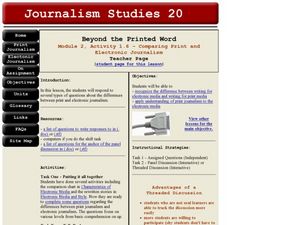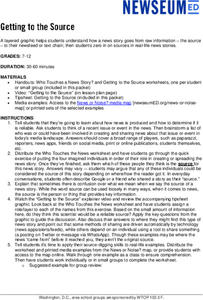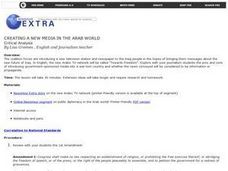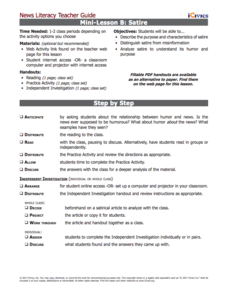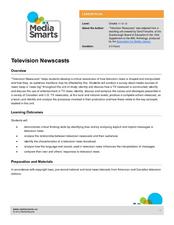Curated OER
A Free and Open Press: Evaluating the Media
Students compare and critically evaluate the different media as sources of news, develop criteria for defining "news", experience the editorial process of selecting news stories and detect bias in news reporting.
Curated OER
The Electric Experience
Students investigate the effects of television and radio on culture. In this journalism lesson, students consider how electronic media has shaped journalism as they create timelines that feature the changes and compare and contrast print...
Curated OER
Beyond the Printed Word
Learners investigate the effects of television and radio on culture. In this journalism lesson, students consider how electronic media has shaped journalism as they create timelines that feature the changes and compare and contrast print...
Curated OER
Watching the Clock: An activity to build media-savvy students
Students analyze time constraints on broadcast news. They apply data collecting and data display skills. They identify the difference between news progams and the evening news.
Social Media Toolbox
Law Review
How can your journalism class ensure they use social media responsibly and legally? The sixth lesson in a 16-part Social Media Toolbox series asks pupils to dig deep into the legal aspects of social media use by school publications....
Social Media Toolbox
Ethical Decision Making
When faced with a dilemma, how do journalists decide how much news to use? Social media scholars explore the philosophies of ethical resolution in the first of a 16-part Social Media Toolbox series. Partnered pupils use a Potter Box to...
Newseum
Getting to the Source
Reliable news stories are based on facts from reliable sources. Young journalists learn how to evaluate the reliability of news sources by watching a short explainer video. Teams apply their new source-digging skills to a current news...
Facebook
Versions of Media Texts
Verification of provenance and the original source of an image or video can be a long and winding process. Young journalists learn about the difficulty of finding the original source of a scrape, a copy of an original news story, and...
Curated OER
Creating a New Media in the Arab World
Students explore the pros and cons of government-sponsored media into a war-torn country and determine whether the news will be considered information or propaganda.
Curated OER
Electronic Media
Students compare forms of electronic media. They watch a news broadcast and take notes on the content being conveyed. After viewing the broadcast, they read newspaper articles or news magazines to locate articles with similar content to...
Curated OER
Citizen Journalism
Learners examine the role of citizen journalism, freedom of the press, and the First Amendment. They analyze the results of an Internet survey, discuss the ethics of downloading copyrighted material on the Internet, and write a news story.
News Literacy Project
Fact-Check It!
Here's a lesson designed to help learners develop their digital verification skills. First, expert groups study specific digital verification skills, and in a jigsaw activity, share what they have learned with classmates. The jigsaw...
Facebook
Metadata
In previous lessons, young journalists learned about how to trace the original source of scrapes and memes. This interactive lesson plan teaches them another important step in the verification process. Participants learn how to analyze...
iCivics
Mini-Lesson B: Satire
Hey, what's so funny? Explore the use of satire in a variety of media with a hands-on instructional activity. Fourth in a five-part journalism series from iCivics, the activity introduces satirical language in print and online. Pupils...
iCivics
NewsFeed Defenders
How can people learn to spot viral deception? Players do just that with the NewsFeed Defenders media literacy game. Scholars choose avatars and the focus of their news feeds: student life, health and wellness, or sports and...
Media Smarts
Television Broadcast Ratings
Explore the relationships between programming, advertising, and the ensuing rating wars. Help develop the media smarts of your pupils through this examination of advertisers for popular shows. Although the included Sweep Chart features...
Curated OER
Media Literacy Skills
Third graders watch a news story from three different networks in order to determine how the same story can be presented in three different ways. Next, working in small groups they create a newscast of a current event to share with the...
Curated OER
Shaping the News
Students explore television journalism. In this journalism activity, students discuss the attributes of television broadcasting. Students then review their journalism code of ethics and then conduct research for stories that have a moral...
Curated OER
Lesson Plan: The Black Press
Students examine the history of the black press. In this media awareness lesson, students watch videos and conduct research regarding the history of the black press in America. Students explore media careers as they read provided...
Media Smarts
Bias
See how bias operates firsthand. Half of the class reads one article while the other half reads another article on the same event. The obvious differences emerge when the two sides talk about their observations though. Several handouts...
American Press Institute
In the Newsroom: The Fairness Formula
Reporting the news is easy, right? Think again! Show young scholars the difficult choices journalists make every day through a lesson that includes reading, writing, and discussion elements. Individuals compare the language and sources...
Facing History and Ourselves
Hands Up, Don't Shoot!
Why is it so difficult to develop a clear understanding of the events surrounding the shooting of Michael Brown by a Ferguson, Missouri, police officer? To answer this question class members listen to a NPR discussion of the findings of...
Curated OER
Television Newscasts
When we watch news broadcasts on television, we receive a much more visual perspective than when we read the newspaper. How do sets, clothing, and music contribute to our understanding of the story? Compare American and Canadian news...
Curated OER
Media Awareness: Helping a Product Cross the Finish Line
Students develop critical thinking skills to understand and create advertisements. In this journalism lesson, students analyze the elements necessary for effective advertisements and work in cooperative groups to create and present...




